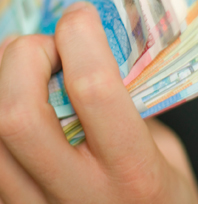December 9 is the UN Assembly’s awareness-raising International Anti-Corruption Day. Corruption is a complex social, political and economic phenomenon that affects all countries. Corruption undermines democratic institutions, slows economic development and contributes to governmental instability, says the United Nations.
The pressure group Transparency International opened the voting phase of its Unmask the Corrupt campaign to highlight the most symbolic cases of grand corruption.
TI defined grand corruption as the abuse of high-level power that benefits the few at the expense of the many, and causes serious and widespread harm to individuals and society.
Transparency International Chair José Ugaz said: “Please join us in this new effort to stop grand corruption and vote for the case that you think would best describe it. Your vote is important. Together we can make governments understand the urgency to act and stop this disease.”
The cases identified on unmaskthecorrupt.org were picked from 383 submissions from the public. Some are political leaders or multi-national companies that have massively abused their power and severely harmed society. Others, like the state of Delaware, serve as powerful symbols of how the corrupt are able to use anonymous companies to buy luxury yachts or real estate, or pay for lawyers to protect them, according to TI.
“For far too long the corrupt have gotten away with their systematic abuses of power, terrible human rights violations and the general destruction of the daily lives of people. This ability to act with impunity must stop. Once we have identified the world’s greatest symbols of grand corruption, we will pursue social and legal sanctions for their deeds against the people, especially the poorest.
“We want as many people as possible to engage in fighting corruption and we will help focus these efforts by showing what needs to be done by governments and individuals. We are calling on everyone to be part of the fight to end grand corruption and bring the corrupt to justice.”
The TI list in alphabetical order:
Banco Espírito Santo of Portugal
Senator Felix Bautista of the Dominican Republic
Zine Al Abidine Ben Ali, former President of Tunisia
China Communications Construction Company
Delaware, US state that allows registration of anonymous companies
Isabel Dos Santos of Angola
FIFA
Akhmad Kadyrov Foundation of Chechnya
Systemic corruption of the government, authorities and institutions in Lebanon
Ricardo Martinelli, former president of Panama, and his cronies
Egypt’s former President Hosni Mubarak
Myanmar jade trade
Teodoro Obiang of Equatorial Guinea
Petrobras
Ukraine’s ex-president Viktor Yanukovych.
Voting goes to February 9, 2016. Transparency International says that it will then look at the cases that have received the most votes and will openly discuss with all how the corrupt should be punished.










